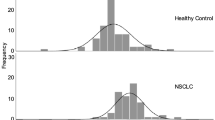Abstract
Although oncological treatments are improving, the prognosis of non-small-cell lung cancer (NSCLC) patients has not. Several biomarkers related to prognosis have been evaluated, and M30 and M65 have been reported to be higher in patients with NSCLC than in healthy people. In the current study, we evaluated the clinical importance of the change in serum M30 and M65 values after chemotherapy in patients with NSCLC. Serum M30 and M65 values were measured before and 48 h after chemotherapy in thirty-two patients with advanced NSCLC. The importance of the change in the levels of these markers after chemotherapy was analyzed by univariate analysis. The median serum M65 and M30 values increased significantly after chemotherapy (p < 0.001). The median M30 value after chemotherapy was an important prognostic factor for both overall survival (OS) (p = 0.002) and progression-free survival (PFS) (p = 0.002). Stage and histopathological type were significant both for PFS and OS. Multivariate analysis showed that the median M30 value after chemotherapy was the only independent prognostic factor for PFS (p = 0.04, HR 5.4) and OS (p = 0.02, HR 11.49). Our results indicated that both serum M30 and M65 values increased after chemotherapy in patients with advanced NSCLC, and an elevated serum M30 value was an independent prognostic factor for both PFS and OS.


Similar content being viewed by others
References
Yaman E, Coskun U, Sancak B, Buyukberber S, Ozturk B, Benekli M. Serum M30 levels are associated with survival in advanced gastric carcinoma patients. Int Immunopharmacol. 2010;10:719–22.
Ueno T, Toi M, Linder S. Detection of epithelial cell death in the body by cytokeratin 18 measurement. Biomed Pharmacother. 2005;59:359–62.
Ueno T, Toi M, Bivén K, Bando H, Ogawa T, Linder S. Measurement of an apoptotic product in the sera of breast cancer patients. Eur J Cancer. 2003;39:769–74.
Kramer G, Erdal H, Mertens HJ, et al. Differentiation between cell death modes using measurements of different soluble forms of extracellular cytokeratin 18. Cancer Res. 2004;64:1751–6.
Hickman JA, Beere HM, Wood AC, Waters CM, Parmar R. Mechanism of cytotoxicity caused by antitumor drugs. Toxicol Lett. 1992;64:553–61.
Ulukaya E, Karaagac E, Ari F, et al. Chemotherapy increases caspase-cleaved cytokeratin 18 in the serum of breast cancer patients. Radiol Oncol. 2011;45:116–22.
Demiray M, Ulukaya E, Arslan M, et al. Response to neoadjuvant chemotherapy in breast cancer could be predictable by measuring a novel serum apoptosis product, caspase-cleaved cytokeratin 18: a prospective pilot study. Cancer Invest. 2006;24:669–76.
Kramer G, Schwarz S, Hägg M, Havelka AM, Linder S. Docetaxel induces apoptosis in hormone refractory prostate carcinomas during multiple treatment cycles. Br J Cancer. 2006;94:1592–8.
de Haas EC, di Pietro A, Simpson KL, et al. Clinical evaluation of M30 and M65 ELISA cell death assays as circulating biomarkers in a drug-sensitive tumor, testicular cancer. Neoplasia. 2008;10:1041–8.
Olofsson MH, Ueno T, Pan Y, et al. Cytokeratin-18 is a useful serum biomarker for early determination of response of breast carcinomas to chemotherapy. Clin Cancer Res. 2007;13:3198–206.
Bilici A, Ustaalioglu BB, Ercan S, et al. Is there any impact of plasma M30 and M65 levels on progression-free survival of patients with advanced gastric cancer? Cancer Chemother Pharmacol. 2011;68:309–16.
Koelink PJ, Lamers CB, Hommes DW, Verspaget HW. Circulating cell death products predict clinical outcome of colorectal cancer patients. BMC Cancer. 2009;9:88.
Dive C, Smith RA, Garner E, et al. Considerations for the use of plasma cytokeratin 18 as a biomarker in pancreatic cancer. Br J Cancer. 2010;102:577–82.
Jemal A, Siegel R, Ward E, Hao Y, Xu J, Thun MJ. Cancer statistics, 2009. CA Cancer J Clin. 2009;59:225–49.
Ulukaya E, Yilmaztepe A, Akgoz S, Linder S, Karadag M. The levels of caspasecleaved cytokeratin 18 are elevated in serum from patients with lung cancer and helpful to predict the survival. Lung Cancer. 2007;56:399–404.
Goldstraw P, Crowley J, Chansky K, et al. International association for the study of lung cancer international staging committee; participating institutions. The IASLC lung cancer staging project: proposals for the revision of the TNM stage groupings in the forthcoming (seventh) edition of the TNM Classification of malignant tumours. J Thorac Oncol. 2007;2:706–14. Erratum in: J Thorac Oncol. 2007;2:985.
James K, Eisenhauer E, Christian M, et al. Measuring response in solid tumors: unidimensional versus bidimensional measurement. J Natl Cancer Inst. 1999;91:523–8.
Green AM, Steinmetz ND. Monitoring apoptosis in real time. Cancer J. 2002;8:82–92.
Hou JM, Greystoke A, Lancashire L, et al. Evaluation of circulating tumor cells and serological cell death biomarkers in small cell lung cancer patients undergoing chemotherapy. Am J Pathol. 2009;175:808–16.
Wu YX, Wang JH, Wang H, Yang XY. Study on expression of Ki-67, early apoptotic protein M30 in endometrial carcinoma and their correlation with prognosis [Article in Chinese]. Zhonghua Bing Li Xue Za Zhi. 2003;32:314–8.
Acknowledgments
This manuscript was not supported by any financial or other relationships.
Conflict of interest
None.
Author information
Authors and Affiliations
Corresponding author
Rights and permissions
About this article
Cite this article
Ustaalioglu, B.B.O., Bilici, A., Ercan, S. et al. The prognostic importance of changing serum M30 and M65 values after chemotherapy in patients with advanced-stage non-small-cell lung cancer. Med Oncol 30, 551 (2013). https://doi.org/10.1007/s12032-013-0551-6
Received:
Accepted:
Published:
DOI: https://doi.org/10.1007/s12032-013-0551-6




